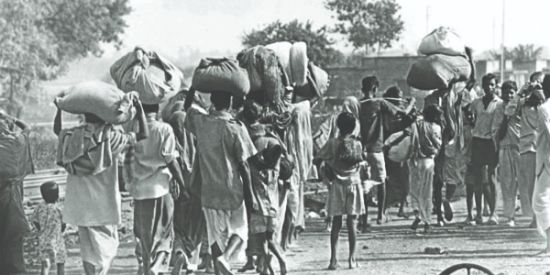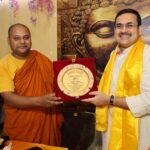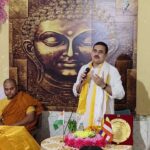Communist perfidy on CAA
- By : Anirban Ganguly
- Category : Articles

Divisive Anti-CAA stand taken by the left runs contrary to its historical stance on the issue, likely resulting from irrational rejection of the Modi government
The communist parties of India have a history of being proponents and supporters of separatism and of forces and elements which represent, articulate or symbolise separatist tendencies while professing the ideologies of subversion. This essential standpoint leads them to voice support for terrorists in Kashmir, Islamists radicals in Tamil Nadu, Kerala and West Bengal. They are also at the forefront of organising international propaganda against India whenever they find an opportunity to do so.
The arrest of Taha Faizal and Alan Suhaib, both active CPIM members, last November, for distributing Maoist pamphlets, clearly proved there is a clear link between Islamists and Maoists. That a section among the CPIM cadres is active in keeping that link alive came to light with the arrest of Faizal and Suhaib. In the now petering out anti CAA protests across the country, the CPIM played and continues to play a major role in strengthening and providing succour to elements who, having infiltrated and engineered these protest, have as their objective, the generating of unrest across the country and the creation of conflagrations and zones of conflict.
Splinter parties like the CPIML and its violent student outfit the AISA, which has been at the forefront of organising celebrations each time Indian security force personnel are attacked, killed or maimed in terror attacks, have all joined hands to oppose CAA. They are hell-bent on trying to prevent the granting of citizenship to the large number of Dalit refugees who were forced to flee religious persecution in Pakistan. By opposing CAA, not only is the CPIM and its other communist partners taking a stand which is anti-Parliament and Constitution but it is also wilfully partnering with India-wrecking forces. A diminishing electoral footprint is not its concern, it is obsessed rather with ensuring that these regressive forces gain strength. That said, let us have a look at the hypocrisy of the Left political conglomerate on the CAA.
The white paper issued by Dr Syama Prasad Mookerjee Research Foundation, has brought to light again the various statements made in the past by communist leaders, mainly in Parliament, in support of refugees and their right for a dignified life. Since its publication, the white paper, which mainly gives a historic background to the demand for citizenship has been widely circulated and has served to expose the perfidy and duplicitousness of Left politics in India.
Let us start from the past, at the time of partition, it is interesting to note, as Prafulla Chakrabarti sites in his seminal work “Marginal Men”, which I have referred to earlier, that the “Communist Party refused to accept the existence of the luckless victims of communal hatred.” In their dialectical wisdom, the leaders of the CPI decided that after partition there would be “one party for both dominions.” The comrades in Pakistan were, therefore, directed not to migrate to India. Krishnabinode Roy and Mansur Habibullah from West Bengal were sent to organise the party in East Bengal while Sajjad Zaheer was sent to West Pakistan, “these three communists were arrested within a month of their arrival in Pakistan.” Other “important communists of East Pakistan,” Chakrabarti writes, “were sent to jail” and those other “well-known party members who came over to West Bengal disregarding the party mandate were promptly expelled.” Yet the communists of today have a habit of singing paeans to Pakistan!
In the decade before partition, the Communist Party became active in the region which later formed Pakistan. In East Bengal, the party comprised mostly of middle-class Hindus and over the years leading to partition these leaders had managed to build up “small and disparate Communist pockets among the peasantry and tribals in different parts of East Bengal.”
In their detailed work, “Religion and Politics in Bangladesh and West Bengal: a study of Communal Relation” (1993) Sukumar Biswas and Hiroshi Sato, give a graphic description of what happened to comrades and their tribal cadres whom they led, in East Pakistan in 1950, “Village after village was indiscriminately burnt down, peasants were beaten and tortured mercilessly. They created a reign of terror by free looting and raping of the Santal women went at will. 24 Santal peasants succumbed to death due to police torture inside Nachole [Rajshahi division] police station. Innumerable peasants were killed in Nawabganj and Rajshahi Jails. One of the notable leaders of the movement, Ila Mitra (leader of the CPI, leading the Santals in the Tebhaga movement) was brutally tortured in several ways including rape. The pervasive and multi-directional torturing compelled several Santal peasants to emigrate to West Bengal.”
Biswas and Sato are cited by A.J.Kamra, in his deeply disturbing book, “The Prolonged Partition and Its pogroms: testimonies on violence against Hindus in East Bengal 1946-64”, a comprehensively documented volume on how the minorities were driven away from Pakistan over the years through a systematic cycle of attack and torture by the Pakistani establishment. Comrade Ila Mitra was imprisoned for life in East Pakistan, severely tortured and was released on parole in 1954, only when her health completely collapsed. She came to Kolkata for treatment and never went back, she could not, communists had no place in Pakistan, they could only survive in India. Even when the influx from East Pakistan had “reached formidable proportions”, clearly indicating that minority Hindus had no place in Pakistan, “the Communist Party”, argues Chakrabarti, “hardly gave any thought to this overwhelming mass of suffering humanity. There was no attempt at a serious Marxist analysis of this new phenomenon and a clear definition of the attitude of the Party towards the refugees.”
The disconcerting saga of Ila Mitra and her comrades is perhaps no more narrated in communist party classes since their story is difficult to explain to cadres who are fed on daily doses of how India is turning into a “Hindu fascist republic.” Comrade D.Raja, Comrade Binoy Viswam and Comrade Sitaram Yechury may not have heard of Ila Mitra. Even if they have, they prefer to nudge the memory of her ordeal into shelves of oblivion. She stands as an anti-thesis to the communists’ cacophony against CAA and therefore she must be forgotten, her memory silenced.
While speaking of the ordeals of the socialist and left leaders in Pakistan, it would be relevant, for instance to recall, the experiences of Professor Samar Guha, one of the most well-known acolytes of Netaji Subhas Chandra Bose. Guha also became a Member of Lok Sabha in 1977. He had remained in East Pakistan after partition, was imprisoned in Dhaka and finally was forced to come away to India in 1951. Towards his last phase, Guha gravitated towards the Janata Dal (secular). JDS leaders today, who have opposed the CAA, would scarcely know what Guha went through in East Pakistan. One doubts whether they even remember who he was!
In his book “Non-Muslims behind the curtain in Pakistan”, now out of print, for obvious reason, Guha writes, “A year of Pakistan rolled over. Soon a complete reversal of government policy towards the conscious Hindus became glaringly manifest. East Bengal police suddenly became very active with repressive measures against the conscious non-Muslims. A large number of houses…were searched and many arrests made. At the time of house searches and arrest, big army and police demonstrations were held to create a sense of terror in the mind of the non-Muslims. A further attack came upon the non-Muslims from the side of the Muslim mob…Cries of ‘saboteurs’, ‘enemy agents’, ‘fifth-columnists’, ‘disloyal elements’, etc., were raised by the Pakistani press and the responsible officials and non-official Muslim leaders almost everywhere in East Bengal. Before a year of the new state was completed, a reign of terror was let loose upon the life of both the urban and rural non-Muslims by the police as well the officially inspired Muslim mob…Government propaganda made the Muslim masses firmly suspicious that every Hindu in Pakistan was a fifth column of the Indian Union…In many places, local boards and municipalities, having Hindu majorities, were arbitrarily suspended and their control was taken over by the Govt…” Because Kamra had preserved and cited from this book, these descriptions stand as testimonies of how, since its formation, Pakistan had, in a concerted manner, driven the minorities out. Guha was not an “RSS man” and therefore, perhaps, his testimony will be more acceptable to those, especially the Leftist and the self-styled secularists who opposed CAA. But for convenience sake, they prefer to suppress this dimension of Guha’s life.
But not all communist were as conscience-less as the present breed of Indian communists. Let us start with the example of Comrade Bhupesh Gupta, one of the intellectual and ideological icons of the left movement in India. At least on four occasions Gupta, who was a member of the Rajya Sabha for decades, spoke on the refugees of East Pakistan. It is interesting to read his position, on March 4, 1964, Gupta argued that “we are also committed to the minorities in Pakistan. We have signed the Nehru-Liaquat Pact…we cannot escape our responsibility in regard to this matter…It seems since we signed the Nehru-Liaquat Pact, we went into some kind of sleep, became a little complacent…But it was a mistake. We should have always taken up the cause of the minorities…especially when the agreement, which has some kind of international force, the Nehru-Liaquat Pact, was being violated by Pakistan, it was our duty to have informed the world public opinion through the diplomatic levels and otherwise…” The present crop of communist leaders would be aghast at Gupta’s proposition, in fact, today, they are used to complaining to international community against India, they are the staunchest voices which speak for Pakistan on the international academic circuit!
In 1974, Bhupesh Gupta’s intervention in the issue was even more forceful, in fact, his line of argument was the same as that taken by Prime Minister Modi and Home Minister Amit Shah in December 2019 while pushing forth CAB in Parliament. Gupta’s argument was also in line with the Jana Sangh’s and later the BJP’s argument on the need to fulfil our assurances given to the minorities in Pakistan at the time of partition. Gupta noted how 27 years had passed since the country was partitioned, he asked the House to “recall the speeches of the leaders of the Congress Party at that time, including in particular Jawaharlal Nehru” and how they indicate that “at that time they gave clear assurance in their speeches, even before the country was partitioned, they would fully meet the aftermath of partition and that they will do everything in their power as the Government to resettle and rehabilitate the displaced persons from that part of Bengal which as a result of partition went to Pakistan.
Ironically, these are the same set of questions which the BJP is asking today of the Congress and the communist parties instead of asking these are opposing the BJP for having asked them! I am not referring to Comrade Prakash Karat who had written to the then Prime Minister Manmohan Singh, advocating the need to differentiate between those “who have come to India due to economic reasons” and these people who had to “flee their country in particular historical circumstances over which they had no control…” Karat had argued that the “approach to granting citizenship to these unfortunate persons should be more liberal.” This letter has been amply cited in the last one month and has substantially exposed communist hypocrisy. That the left is bereft of intellectual capital is evident from the manner in which they have jettisoned their past positions and the articulations of some of their leading lights.
On April 25, 2012, one of the most senior parliamentarians from the Left, Basudeb Acharia, for instance, passionately raised the issue “pertaining to lacs of people who came as refugees to our country from erstwhile Pakistan and Bangladesh because of their persecution as minorities”.These refugees “have settled and are staying in different parts of the country and in different states like Uttarakhand, Uttar Pradesh, Madhya Pradesh, Chattisgarh and Odisha” argued Acharia, “they are staying in these States for years together. In spite of staying here for many years, these refugees have not been granted citizenship in our country…” Acharia reminded the then Prime Minister of his assurance that “the granting of citizenship of these refugees would be considered favourably but the Central Government, till today, have not considered granting citizenship to lacs of Bengali refugees…” Acharia, therefore, demanded that the “Citizenship Act should be amended to grant citizenship to these Bengali refugees.”
Two other CPIM MPs, Shyamal Chakraborty and Prasanta Chatterjee, associated themselves with Acharia’s demand. In his intervention, Chatterjee, in fact, went into a long-winded citation of the assurances given by leaders such as Mahatma Gandhi, Nehru, Sardar Patel and others. Much in the same vein as Bhupesh Gupta decades earlier, Chatterjee reminded the House, that “when the country was partitioned, at that time there were some national commitments to the people who suffered because of this partition. Those commitments were made by persons like Mahatma Gandhi, Sri Jawaharlal Nehru and Sardar Vallabhbhai Patel. They guaranteed the security and safety of the people who were victims of the partition, that if they were forced to come over to this side of the subcontinent, they will be protected and given shelter.”
As recently as 2012, the 20th Congress of the CPIM held at Kozhikode, had called upon “the Central Government to honour the assurance given by the Prime Minister to sympathetically consider the legitimate demand of the large numbers of Bengali refugees to recognise them as citizens of India. They had fled their country erstwhile East Pakistan and then Bangladesh. The CPIM accepted that “a large number of these refugees belong to the Scheduled Castes, Namasudra communities and are living in different parts of the country.” Adopting a perfidious stand today, the present CPIM leaders thus have forsaken their past stance on the matter.
At a time when the communist leaders are trying to keep themselves relevant by opposing the CAA, it is also necessary to remind them of their past record of massacring Bengali Hindu Dalit refugees who had taken shelter and had aspired to build for themselves a new life in the island of Marichjhapi in the estuary of Sunderban in 1979. It is a redeeming sign that the suppressed memory of that bloody episode is now re-surfacing in the collective mind of West Bengal and of the country as a whole. It was a pogrom in which the communists can never be absolved of active complicity, a pogrom in which their complicity has been proved and documented and which remains unparalleled in the history of independent India.
A section of the refugees, having been promised by the communists that they would fight for their rights, threw their lots behind the communist party. Having gradually propped themselves upon the shoulders and sweat of refugees, having promised them rehabilitation in West Bengal once they were in power, having sent several feelers through leaders who repeatedly visited them, the communists conveniently forgot the refugees once they came to power in 1977. When these refugees, driven by that promise of a return to West Bengal, a land that was of the same soil and aroma as that which they were forced to leave behind, began moving towards the state and to settle in the far off remote estuary island of Marichjhapi, they were fired upon, killed, their huts burnt and their wells poisoned, their children drowned and starved by the CPIM led Left Front government then headed by Comrade Jyoti Basu. The refugees did not want to be dependent on the government, they did not want to survive on doles, all that they had asked for was a corner which they could call their own and start afresh and pick up the threads of their broken and shattered lives.
Instead of fulfilling its promise, instead of commiserating with them, most of whom were Dalits, Comrade Jyoti Basu’s government ordered them to be killed and thrown to the sharks. This is the reality of how Indian communists treated Bengali Hindu Dalit refugees in the past. Between eight to ten thousand refugees were killed or maimed in this anti-refugee communist action. The communists have always stood by the illegal infiltrator while passing resolutions in support of refugees. But in reality, they have always opposed all attempts at conferring on them the possibilities of a dignified life and have instead sided with the politics of vote-bank, in their case entirely based on the infiltrator.
Through their opposition to the CAA, their outpouring of venom against it by passing resolutions and by carrying on an international campaign of calumny against it, the communist parties and the Left parties in India are resorting to a second Marichjhapi. They are trying to crush the souls and aspirations of these refugees who have at last begun seeing a way out of an anonymous and uncertain existence because of the passage of the CAA.
This perfidious and duplicitous behaviour, this approach of trying to decimate the aspirations of these refugees, the constant teaming up with the separatists’ demand of India’s dismemberment delineates the crisis of the Left in India. In their self-consuming hatred for the Narendra Modi dispensation, they have lost even the little sense of India they had once possessed. Their blind and irrational opposition to the CAA is the latest manifestation of that. It also announces their final unravelling.

















